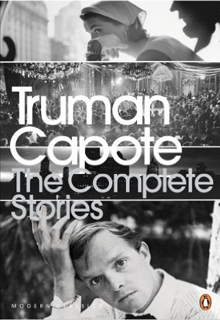
('Christmas Is Almost Here' © Olin Gilbert, 2013)
CAPOTE’S CHRISTMAS
By ANUSHREE NANDE
‘A Christmas Memory’ by Truman Capote is far from being a feel-good holiday story, but that shouldn’t deter the reader from diving right into a ‘morning in late November’ when a woman, whom the narrator refers to only as his friend, looks out of the window of the farmhouse and exclaims that it is ‘fruitcake weather’.
Capote’s tale of the bond between a sixty-year-old woman and a seven-year-old boy (himself) may not rank high among his other literary works, but there is much here that throws light on his unconventional childhood, his complicated relationship with distant parents, and the roots of the much-troubled and controversial adult the world is familiar with.
Born in New Orleans to Archulus Persons and Lillie Mae Faulk, Truman Capote was sent to live with family in Monroeville, Alabama, where his mother had grown up. It is here that, as a neglected and rather effeminate child, Capote found a kindred spirit in his much-older cousin, Miss Sook Faulk, who he describes as ‘still a child’ in the story. They had to rail against those around them who didn’t understand their deep friendship or their eccentricities.
Other people inhabit the house, relatives; and though they have power over us, and frequently make us cry, we are not, on the whole, too much aware of them. We are each other’s best friend.
 In the story, the narrator sets the scene on that morning in late November with deft descriptions of the kitchen and of his friend – white, shorn hair, tennis shoes, and a shapeless grey sweater over a summery calico dress. At this point we are already part of their private world and share in their excitement as an annual ritual unfolds. They have a ‘Fruitcake Fund’ where they save and scrape together money throughout the year to make holiday cakes for their ‘friends’ – people, the narrator says, they have met only once or not at all, ranging from Baptist missionaries, the knife-grinder who comes through town twice a year, and even President Roosevelt!
In the story, the narrator sets the scene on that morning in late November with deft descriptions of the kitchen and of his friend – white, shorn hair, tennis shoes, and a shapeless grey sweater over a summery calico dress. At this point we are already part of their private world and share in their excitement as an annual ritual unfolds. They have a ‘Fruitcake Fund’ where they save and scrape together money throughout the year to make holiday cakes for their ‘friends’ – people, the narrator says, they have met only once or not at all, ranging from Baptist missionaries, the knife-grinder who comes through town twice a year, and even President Roosevelt!
Is it because my friend is shy with everyone except strangers that these strangers, and merest acquaintances, seem to us our truest friends?
We are swept up in events as Sook and the narrator (she calls him Buddy after a childhood friend who died young) prepare for Christmas. They hitch up a buggy made from a dilapidated baby carriage that was once the narrator’s, and go to find pecans hidden amongst the fallen leaves and frost, using the same buggy to bring home their purchases of ‘cherries and citron, ginger and vanilla and canned Hawaiian pineapple’. Retiring to Sook’s room, away from the eyes of the others, they carefully count the money from their fund on a ‘scrap-quilt-covered iron bed painted rose pink, her favourite colour’. They venture into the forest to pick out the perfect Christmas tree – ‘twice as tall as a boy. So a boy can’t steal the star’ – before making decorations and Christmas presents for their family and for each other.
For those of you hooked onto your plot twists and reveals, I will warn you that nothing ‘exciting’ happens in the story, but it doesn’t matter. The descriptions are detailed and poetic while using no convoluted words. They animate place, character, even the pair of handmade kites that Sook and Buddy gift each other for Christmas. The same writing that appears irreverent and flippant in Breakfast at Tiffany’s is transformed here into a light, breezy style that doesn’t get weighed down with the content, yet never glosses over its considerable depths. Capote is a master of evocative simplicity that makes even the ordinary shine and sparkle until you feel like you know the characters intimately, as though they are old friends to whom you are paying a visit. So when, on Christmas Day, after they have been flying their kites, Sook says that God is in the small things and she could leave the world with today in her eyes, we feel a sense of true intimacy with her epiphany. This is to be their last Christmas together and, at the end, we brace ourselves for the inevitable, just as Buddy, who is shipped off to military school, knows it in his bones even before he hears the news.
 This story isn’t just a throwback to a simpler, uncomplicated time. Neither Sook nor Buddy has it easy and lack of money is the least of their worries. Even Capote, when questioned years later about his childhood, said that he felt like “a spiritual orphan, like a turtle on its back”. Instead, it is also about two very lonely, seemingly mismatched people who try and create their own magic. They ‘feel connected to eventful worlds beyond the kitchen with its view of a sky that stops’, through their scrapbook of the thank-you cards they receive for their fruitcakes. And if the clarity and fondness evident in every word of the story is anything to go by, it shows that, despite everything, the time Capote spent with Sook and Queenie – ‘our tough little orange and white rat terrier who has survived distemper and two rattlesnake bites’ – was some of his most treasured. A small haven of complete acceptance among the other isolation of his childhood with another misunderstood, unloved and ignored soul. If what came after is any indication, it appears that he never let go of that little boy.
This story isn’t just a throwback to a simpler, uncomplicated time. Neither Sook nor Buddy has it easy and lack of money is the least of their worries. Even Capote, when questioned years later about his childhood, said that he felt like “a spiritual orphan, like a turtle on its back”. Instead, it is also about two very lonely, seemingly mismatched people who try and create their own magic. They ‘feel connected to eventful worlds beyond the kitchen with its view of a sky that stops’, through their scrapbook of the thank-you cards they receive for their fruitcakes. And if the clarity and fondness evident in every word of the story is anything to go by, it shows that, despite everything, the time Capote spent with Sook and Queenie – ‘our tough little orange and white rat terrier who has survived distemper and two rattlesnake bites’ – was some of his most treasured. A small haven of complete acceptance among the other isolation of his childhood with another misunderstood, unloved and ignored soul. If what came after is any indication, it appears that he never let go of that little boy.
This makes ‘A Christmas Memory’ an even more precious commodity. This is pure, raw, flawed Capote without the infamous big personality, the pretence and other paraphernalia that surrounded him through much of his later life. It is genuine and sweet; the innocence and sense of wonder of a seven-year-old boy perfectly balanced with the more mature and retrospective bent of mind that has painstakingly, almost reverently, recreated the moments as an adult. He manages to craft an engaging intimacy of his very unique Southern origins and allows us to share in his memories, prompting us to look back on our own. Best of all, it is a beautiful, heart-felt tribute to the one person who truly understood and accepted him for who he was. The ‘only stable person’ in his life. Though she never got to read it.
And as long as you remember me, then we’ll always be together.
~
 Mumbai-based Anushree Nande is still figuring out her superpower. Arsenal, perhaps irrationally, dominates many of her waking (and sleeping) hours; the rest she spends freelancing, reading, writing, working through creative demons with sport and art, and asking herself what Coach Taylor would do. Her microfiction collection, 55 Words, published by Underground Voices is available on Amazon, and you can read her other work on Flash Fiction Magazine, Litro Online, Huffington Post, Thresholds, CommuterLit, Cadaverine, Football Paradise, Gunners Town and more. Anushree Nande’s website is: Black marks on a page
Mumbai-based Anushree Nande is still figuring out her superpower. Arsenal, perhaps irrationally, dominates many of her waking (and sleeping) hours; the rest she spends freelancing, reading, writing, working through creative demons with sport and art, and asking herself what Coach Taylor would do. Her microfiction collection, 55 Words, published by Underground Voices is available on Amazon, and you can read her other work on Flash Fiction Magazine, Litro Online, Huffington Post, Thresholds, CommuterLit, Cadaverine, Football Paradise, Gunners Town and more. Anushree Nande’s website is: Black marks on a page


2 thoughts on “Capote’s Christmas”
Comments are closed.